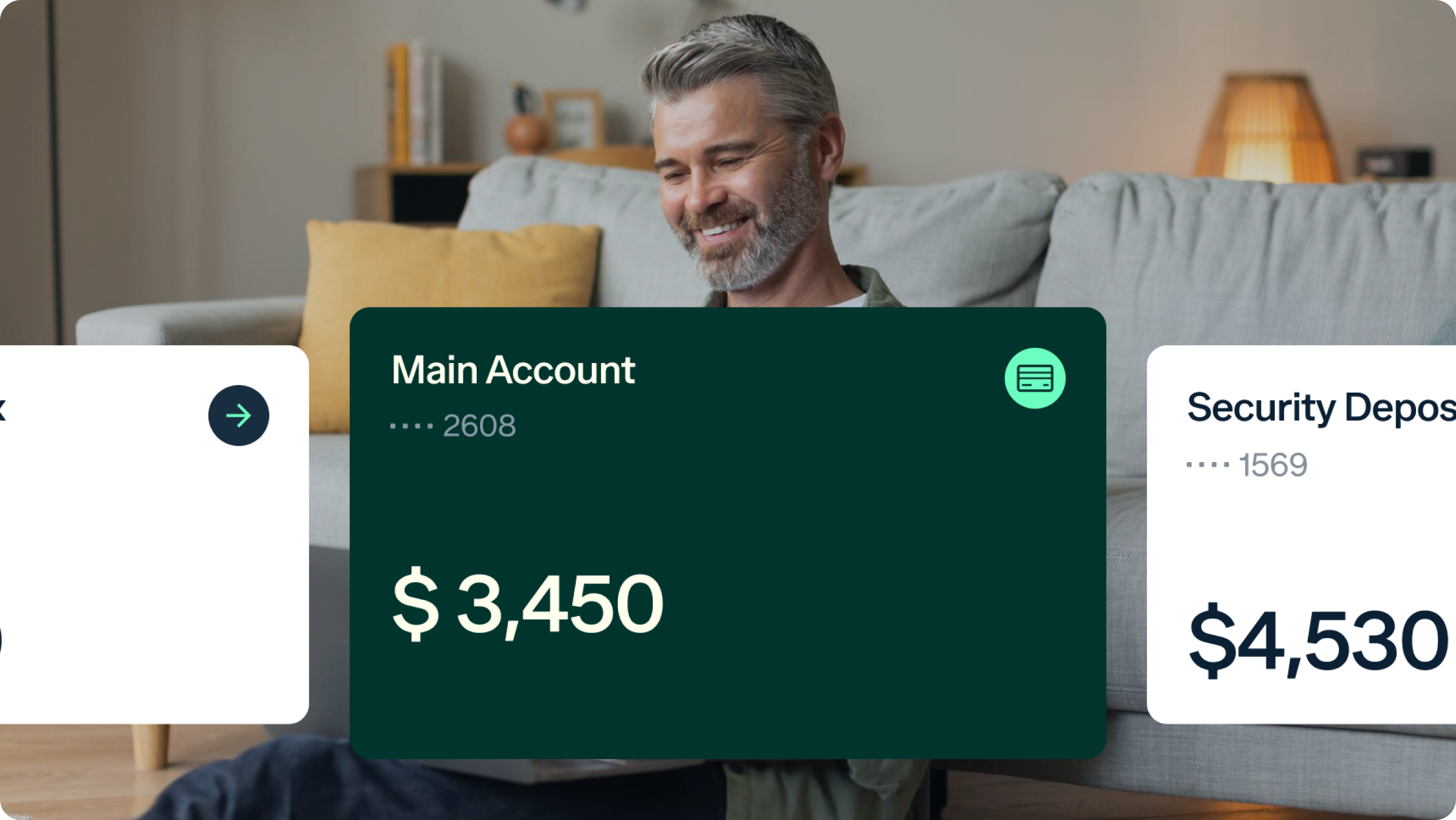Managing utility bills for rental property can quickly become a complex and time-consuming task. Juggling invoices for electricity, water, gas, and more across multiple units can feel like a constant headache. As your portfolio grows, tracking utility expenses gets harder.
Fortunately, there’s a powerful solution designed to tackle this challenge head-on: utility bill management software. This specialized software streamlines the entire process, from getting invoices to billing tenants and tracking expenses.
This guide breaks down utility bill management software—what it is, the features that matter, and how to find the right fit for your rental business.
Key takeaways
- Integrated software combines property financial management with banking services.
- Adoption of property management software is increasing among real estate professionals.
- Key features cover banking, rent collection, accounting, reporting, and expense tracking.
- Choosing the right software depends on your portfolio size and specific needs.
What is real estate financial management software?
Real estate financial management software is a digital tool designed to help landlords and investors handle the monetary aspects of their properties. This includes tracking income, managing expenses, and generating financial reports. When integrated with banking, this software allows users to directly link or open bank accounts within the platform.
This integration means that transactions flow seamlessly from the bank account directly into the software’s accounting ledger. It creates a unified system for rental property money management, reducing the need for manual data entry and reconciliation between separate systems. The goal is to simplify financial management for rentals and provide a clearer picture of a property’s financial health.
Some platforms like Baselane even offer integrated banking directly within their service. This allows you to create dedicated checking or savings accounts for your properties. Funds can be held, payments made, and income received all within the financial management software environment.
Why landlords and property managers are adopting financial management software
The real estate software market is experiencing significant growth. It is projected to expand substantially in the coming years, reaching an estimated $26.7 billion by 2034. This growth reflects a broader trend towards digital adoption in the industry. As of 2025, approximately 67% of property management companies have adopted property management software.
About 72.5% of real estate professionals incorporate CRM software into their workflow, which often includes financial management features. Manual management increases the risk of non-compliance with local tax and regulatory requirements. Automated processes handle complex calculations and data entry faster and more accurately than manual efforts.
Real-time data access and reports foster trust and help meet compliance standards. Using a spreadsheet or personal account for a rental property can lead to confusion. This highlights the difference between a personal bank account and vs. business account for real estate.
A dedicated landlord business bank account managed through integrated software provides clarity. Leveraging online digital banking integrated into financial management software helps streamline these processes.
Essential features of integrated real estate financial software
The most effective real estate financial software includes a suite of features designed to cover every aspect of managing rental income and expenses. These features work together to provide a comprehensive tool for real estate financial planning. Having the right tools is crucial for building a solid rental property financial model.
Let’s explore the key components you should look for in integrated software.
Banking features
Integrated banking platforms offer accounts directly within the software, providing a central hub for financial transactions. You can manage unlimited accounts for each property or purpose, like security deposits. This level of organization simplifies financial management for rentals significantly.
Some platforms offer features like virtual and physical debit cards linked directly to these accounts. These cards often include cashback rewards and automated expense tagging. Earning a high-yield online savings account on reserves is another benefit offered by some platforms. You can often get a high-yield savings account tied directly to your property finances.
Rent collection & payment processing
Collecting rent efficiently is paramount for cash flow. Integrated software automates invoicing, sends reminders, and processes tenant payments directly. Tenants can often pay via ACH or card through a dedicated portal. Automated daily or one-time late fees can also be set up.
Real-time payment notifications keep you informed, and payouts are typically deposited within a few days. This makes it the best way to track rental income and ensures consistent cash flow. Rent management software is a core component of these integrated solutions.
Accounting & bookkeeping
Integrated software provides a consolidated ledger of all banking transactions, whether from integrated accounts or synced external accounts. AI-powered auto-categorization helps tag income and expenses based on standard real estate categories like those on Schedule E. You can also capture receipts and add notes for tax purposes. This simplifies using software to track rental income and expenses.
Expense tracking & categorization
Effective real estate financial analysis software requires detailed expense tracking. Integrated platforms automatically sync transactions from linked bank accounts or integrated debit cards. Transactions can be tagged by property and category, providing granular financial data. This feature is key for financial management for rentals and maximizing deductions.
Financial reporting & analytics
Integrated software turns raw transaction data into actionable insights. You gain real-time cash flow visibility and reporting. Detailed reports like income statements and net cash flow statements help you analyze property performance. This allows for better financial decisions and supports your rental property financial model.
Tax preparation support
Being tax-ready is a major benefit of organized financial management. Integrated software can auto-generate tax packages, including income statements and transaction ledgers. Auto-generating Schedule E reports at the click of a button saves significant time. This feature makes tax time less stressful for landlords and accountants.
Tenant & lease management integration
While primarily financial, some integrated platforms include or integrate with tenant and lease management tools. This might involve uploading lease documents or providing a tenant portal for payments and communication. This integration centralizes more aspects of property management alongside finance.
Free All-in-One Property Management Software
Online banking, rent collection, accounting and more-all in one place.
Comparing top real estate financial software with integrated banking
Evaluating platforms based on specific features, especially integrated banking, is crucial. The level of banking integration varies significantly. Below is a comparison of some platforms, highlighting their approach to integrated banking and financial management.
| Evaluation Criteria | Baselane | Rynoh | Swan.io | Buildium | AppFolio |
|---|---|---|---|---|---|
| Integrated Banking | |||||
| APY on Deposits | |||||
| Integrated Debit/Credit Card | |||||
| Automated Rent Collection | |||||
| Integrated Bookkeeping/Accounting | |||||
| Automated Bill Payment | |||||
| Expense Tracking & Categorization | |||||
| Pricing Model | Free base plan + fees for certain transactions/services | Subscription (Enterprise focus) | API/Usage-based for platforms | Subscription (Tiered by units) | Subscription (Tiered by units, Higher end) |
The pros and cons of rental property financial software
Using integrated real estate financial software offers significant benefits, but it’s important to consider potential downsides. The move from manual processes to automated systems requires careful consideration. Understanding these points helps in evaluating if this type of software is the right fit for your rental property finance software needs.
Here are some key advantages and disadvantages:
Pros:
- Automation and efficiency: Automated processes for rent collection, expense tracking, and transaction categorization save substantial time. Integrated banking eliminates manual data entry between bank accounts and accounting software. This allows you to take back time spent on financial busywork.
- Improved financial visibility: Real-time data and reporting provide clear insights into cash flow, profitability, and property performance. This helps you gain clarity and control over your finances. Having a comprehensive view supports effective real estate financial analysis software functions.
- Reduced errors: Automation minimizes the risk of human error in data entry and calculations. This leads to more accurate financial records and reporting. Accurate data is vital for creating a reliable rental property financial model.
- Tax readiness: Auto-categorization and streamlined reporting simplify tax preparation, often generating reports like Schedule E with ease. This helps you maximize tax returns and reduces busy work.
- Centralized management: All your financial tools and banking are in one place, reducing complexity. This provides a single source of truth for your rental asset finance software needs.
Cons:
- Learning curve: Adapting to new software requires time and effort for setup and training. This can be a challenge if you are used to traditional methods.
- Cost: While some platforms offer free tiers, more advanced features or larger portfolios can lead to subscription costs. Subscription costs generally range from $50 to several hundred dollars per month.
- Dependency on platform: You rely on the software provider for functionality, security, and updates. Choosing a reputable and stable platform is essential.
- Integration limitations: While banking is integrated, integrations with other tools (like external tenant screening or maintenance software) might vary. Ensure the platform integrates with other systems you rely on.
- Over-reliance on automation: While helpful, automation requires oversight to ensure categories are correctly assigned and transactions are accurate. Regular review is still necessary.
How to choose the right software for your portfolio
Selecting the best financial software for real estate investors requires careful consideration of your specific needs. Start by evaluating the size and complexity of your portfolio. Consider the specific financial pain points you need to solve, whether it’s rent collection, expense tracking, or detailed reporting.
Prioritize platforms offering true integrated banking, not just basic bank feeds. Look for features that align with your workflow, such as automated bill payment or utility bill management software capabilities if needed. Read reviews and potentially try demos to see how the software handles real-world scenarios.
Factor in the cost structure and ensure it aligns with your budget and expected growth. Consider the platform’s scalability as your portfolio expands. Check for strong customer support and available resources.
Is rental income management software best for small, medium, or large portfolios?
Real estate financial management software with integrated banking can benefit landlords and investors across various portfolio sizes.
- Small portfolios (1-5 units): Integrated software provides much-needed structure and automation, even for a few properties. Using fee-free bank accounts integrated into the software can be very cost-effective. It helps set up good habits early.
- Medium portfolios (6-25 units): These landlords often feel the pain of manual processes most acutely. Integrated solutions offer significant time savings and improved financial clarity, allowing them to focus on growing their business. The efficiency gained is substantial at this level.
- Large portfolios (25+ units): While enterprise-level solutions exist, some integrated platforms scale well for larger portfolios by offering features like multi-user access and robust reporting. Platforms with flexible pricing and strong automation are key here. Solutions that simplify complex financial operations, like those offered by specialized real estate banks, are valuable.
Overall, the benefits of automation, integrated banking, and centralized financial management are valuable regardless of size. The difference often lies in the specific feature depth and pricing models offered by platforms catering to different scales. Look for the best landlord software that fits your current and future needs.
Understanding the cost
The cost of real estate financial management software with integrated banking varies widely. Many platforms offer a free tier with basic features, often sufficient for landlords with only one or two properties. These free plans typically include core banking features and basic rent collection/bookkeeping.
For larger portfolios or access to advanced features like detailed reporting, tenant screening, or premium support, subscription plans are common. Subscription costs generally range from $50 to several hundred dollars per month. Pricing is often tiered based on the number of units you manage. Some platforms may also charge small transaction fees for specific services, like online rent payments via card.
Claiming software costs back
Subscription fees for software used for your rental property business are generally considered deductible business expenses. You can typically claim these costs back when filing your taxes.
However, it’s crucial to consult with a qualified tax professional. Tax laws vary, and they can provide specific guidance based on your situation. They can ensure you are correctly claiming all eligible deductions related to your real estate investment activities.
Streamline your real estate finances with Baselane
Real estate financial management software with integrated banking offers a powerful solution for landlords and investors seeking efficiency and clarity. By unifying banking, accounting, and rent collection, these platforms eliminate manual busywork and reduce errors.
You gain real-time insights into your financial performance, enabling smarter decisions for your portfolio. Whether you have one property or many, leveraging technology built specifically for rental property finance software can significantly improve your operations.
Ready to take back time, gain clarity, and grow your passive income? Explore how Baselane’s integrated banking platform, rent collection tools, and bookkeeping features can streamline your real estate finances. Sign up for free today.
FAQs
The "best" software depends on your specific needs, portfolio size, and desired features like integrated banking or automated bill payment. Evaluate platforms based on their integrated banking capabilities, accounting features, ease of use, and pricing structure relative to your requirements.
Baselane has no monthly fees for its core integrated banking platform, rent collection, and bookkeeping features. Fees may apply for specific transactions, providing a cost-effective solution for rental property money management.
QuickBooks is a general accounting software that can be adapted for real estate, often requiring manual workarounds or third-party integrations. Unlike platforms with integrated banking built in, QuickBooks primarily handles accounting and requires syncing with external bank accounts for transaction data.
Rental asset finance software refers to tools that help manage the financial aspects of real estate assets, including income, expenses, debt, and property performance. Software with integrated banking provides a comprehensive platform covering banking, accounting, and reporting for these assets.








